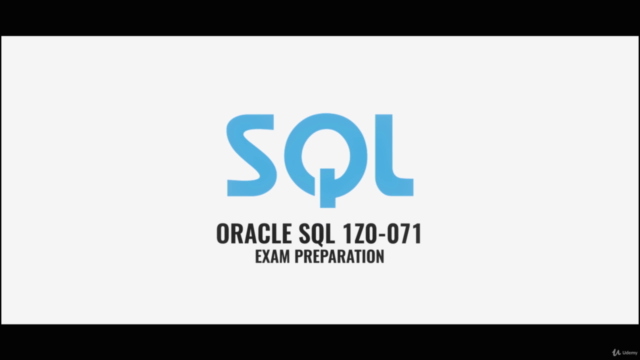Oracle SQL 1Z0-071 Certification - Full exam preparation

Why take this course?
It looks like you're preparing for an Oracle SQL certification exam and are looking for a comprehensive resource to help you study. The topics you've listed cover a broad range of knowledge areas that are typically tested in such exams. Here's a breakdown of the key areas you should focus on, along with some advice on how to use this information effectively:
-
Query Types: Understand the different types of queries and their purposes:
SELECT,INSERT,UPDATE,DELETE, andTRUNCATE. -
Operators: Familiarize yourself with the various operators, including set operations like
UNIONandINTERSECT, as well as comparison operators likeINNER JOIN,LEFT JOIN, etc. -
Functions: Learn the built-in functions such as
COUNT,SUM,MIN,MAX,AVG,TO_DATE,TO_CHAR, and many others, understanding their usage and how they can be applied within queries. -
Conditions: Be proficient with the logical conditions used in SQL queries (
AND,OR,LIKE,IN,NOT IN,IS NULL, etc.) and understand how to effectively use them to filter data. -
Tables and Views: Understand how to create, alter, and drop tables and views, as well as the concept of
CREATE TABLE AS(CTAS). -
Keys and Constraints: Know the importance of primary keys, foreign keys, and other constraints in maintaining data integrity.
-
Data Types: Be aware of different data types in Oracle SQL and how they affect storage and query performance.
-
Window Functions (RANK, DENSE RANK): These are useful for ranking datasets and analyzing rows relative to each other.
-
MERGE Statement: Understand how to use this powerful statement to perform updates or inserts based on the existence of records.
-
Data Dictionary Views: Learn how to query Oracle's metadata to inspect and diagnose issues within your database.
-
Offsets and Fetch Clause: Know how to retrieve data from results with these clauses.
-
ERD Diagram: While not directly used in SQL, understanding the concepts of entity-relationship diagrams is crucial for designing and managing databases.
-
Transaction Control (Commit, Rollback, Savepoint): Know how to manage transactions to ensure data consistency and integrity.
-
External Tables: Understand how to work with external table files that reside outside of the Oracle database.
-
GRANT and REVOKE: Learn how to control access to tables, views, and other database objects.
To effectively study for this exam, you should:
- Use the provided questions to understand not only what is being asked but also why certain answers are correct.
- Practice writing SQL queries for a variety of scenarios.
- Review the official Oracle documentation for any nuances or new features that might be covered in the exam.
- If possible, set up a sandbox environment where you can practice running SQL queries and experimenting with database design and management tasks.
- Use the test exams to gauge your understanding and to familiarize yourself with the format of the real exam.
By covering these topics and practicing regularly, you'll be well-prepared for the Oracle SQL certification exam. Remember that consistent practice and a solid understanding of the concepts are key to success. Good luck with your studies!
Course Gallery




Loading charts...